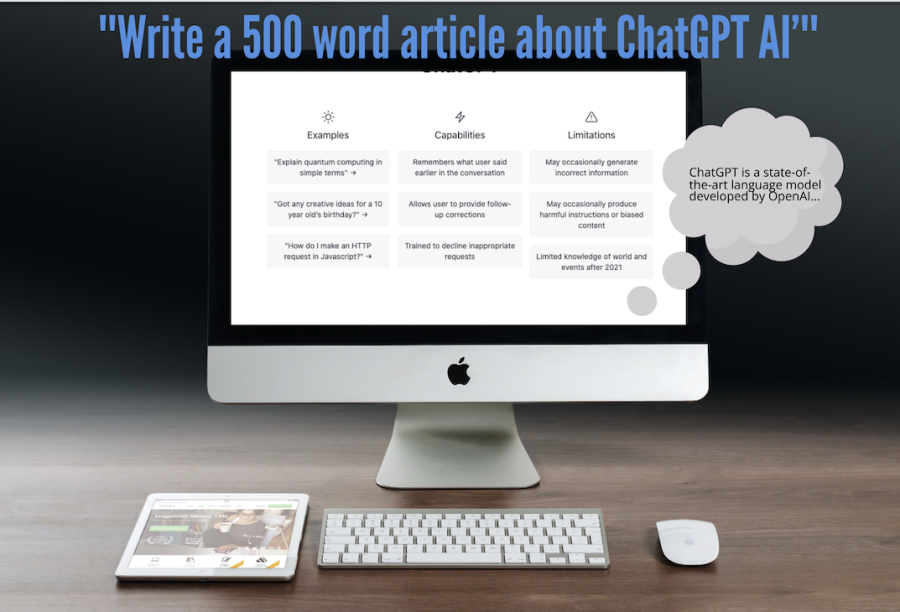The C[h]at is Out of the Bag
Do ChatGPT and similar AI technologies make human work unnecessary?
ChatGPT has the capability to answer almost any question in under a minute.
As society continues to delve deeper into the exponentially-growing world of technology, AI (or Artificial Intelligence) has begun to dominate headlines. This developing technology has the ability to revolutionize the way our world runs and mimic the human brain in a highly-accurate fashion.
One of the most shocking and notable forms of this AI is ChatGPT, which, according to ZDNet, is “a natural language processing tool driven by AI technology that allows you to have human-like conversations and much more with a chatbot,” which can “answer questions, assist you with tasks such as composing emails, essays, and code,” (ZDNET).
Created by OpenAI, this technology allows anyone to, for free, generate an answer to a question–anything from coding to an analysis essay–by simply typing what they want to know into the website’s search bar (try it here.)
This tech may seem like something from the movies, and it truly is. But, as with any new technology promising to solve the world’s problems, many people who work in fields that include writing, education, business, and more are rightfully fearful of the threat this near-perfect AI poses to the imperfect human brain. Many wonder, could this technology take away more human jobs?
“One of my favorite animated movies is Wall-E, and the whole premise of that film is that human beings lost the capacity to be humans because they were replaced in their work by machines, so they’re flying around in a spaceship, sitting in a chair, staring at a screen–and they’re not really people anymore. In that case I do have concerns about the mechanization of work and labor and how advances in tech take away people’s capacity to work,” said English teacher and academic integrity committee member Kyle Roff.
Because of these concerns about cheating or even being replaced by technology, school districts, such as New York City schools, have already made the jump to banning the technology.
Particularly in schools, ChatGPT negates the need to learn the basic writing and communication skills necessary for college and countless careers beyond. Even without the use of AI, cheating and the lack of academic integrity is an age-old problem for middle and high schools. Whether the school be public or private, rural or urban, every school deals with lying and cheating students who want an easy work-around for that boring or challenging analysis paper.
With the introduction of ChatGPT, students now have a smarter and more effective way to beat the system. Because the AI generates a unique answer each time a question or prompt is typed in, no system will pick up plagiarism in the response–allowing for them to easily churn out a well-written essay without even giving the question a second thought or worrying about plagiarism-detection sites such as turnitin.com.
Even Elon Musk, who was formerly on the board of OpenAI, recently tweeted, “It’s a new world, goodbye homework!” in response to a post about the New York Dept. of Education ChatGPT block.
Students may see this as a thing to celebrate, but many teachers right now are thinking the opposite. All over social media sites such as Tiktok, frustrated and worried teachers are posting their concerns about how this technology has the potential to ruin their work in the classroom and the work ethic of an already unmotivated generation of students. Articles in The Atlantic have even gone so far as to declare the introduction of ChatGPT as “The End of High School English” and “The Death of the College Essay.”
But, even in light of the threats AI can pose to society as it rapidly progresses, it’s not all doom and gloom. For one, ChatGPT only has knowledge of information up to 2021, so any news, current events, research, discoveries, etc. within the past year or so is unknown to this seemingly all-knowing chat bot.
Also, even though ChatGPT provides written responses with perfect grammar, if asked to write an essay or opinionated article, the analysis is surface-level at best. Many teachers and professors experimenting with the tool have found that, in more advanced classes involving higher amounts of critical thinking, the chat bot’s paper would potentially receive anything from a C to a B–still passing, but not perfect (and potentially detectable by the teacher due to the awkward combination of impeccable grammar and subpar analysis).
Another promising piece of hope for the future of humanity is the aspect of intelligence beyond even the most complex of data calculations: morality.
“I do not think that our current technology is smarter than a human, because intelligence is not simply the capacity to compute data. To be truly intelligent is to possess wisdom, empathy, and other virtues of a moral quality. An AI, I can never imagine, will have a moral compass beyond what has been programmed by the humans who created it,” said Roff.
While the future of our world and education are uncertain and likely to change with any technological advances such as this one, all we can do is adapt to our environment and keep asking the important, ethical questions. How far is too far? Does this cutting-edge technology help or hurt us in the long run?
Wait and see.




